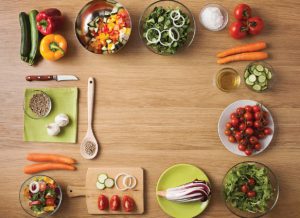By Amira Drori and Danny Shuster
In recent years, a significant amount of people in the United States and around the world have opted into a vegan way of life. Veganism impacts one’s life in many ways. But what are the advantages of this diet, and is it right for you?
At first glance, becoming vegan seems all about eliminating animal products from one’s diet. In reality, veganism delves much further into other areas of our culture and traditions. Let’s explore some of these areas, but first let’s cover the one major question asked by anyone curious about veganism: What do you eat?
Following a vegan diet eliminates all meat, poultry, fish, eggs, dairy products and honey. “What is left?,” you might ask. Quite a lot actually. Vegans eat fruits, vegetables, nuts, grains, legumes and spices. In addition, there are many new products introduced into the market that can help one start and maintain a vegan lifestyle. For example, almond, coconut and cashew milks, meatless meatballs, hamburgers and ground beef which are all made from tofu, seitan, soy and several other meatless alternatives. Although still processed, these options contain no cholesterol, saturated fat or any animal suffering.
With all these new alternative products found at nearly every grocery store, as well as many new vegan restaurants popping up each month, veganism has never been easier. San Diego’s very own neighborhood of Ocean Beach is home to Plant Power, one of the nation’s first all-vegan fast food chains. Plant Power offers burgers, shakes, wraps and many more vegan, and cruelty-free, menu options. Several other popular vegan food chains are popping up nationally such as Veggie Grill, Native Foods, By Chloe and more.
“An apple a day keeps the doctor away,” and vegans are living proof that this old saying is tried and true. Vegans lead the nation in low cholesterol, low blood pressure, lowest doctor visits and generally, vegans have better health.
In recent years, recommendations to switch to a plant based vegan diet are coming from every direction. One major example is Kaiser Permanente’s program to educate physicians and nurses in assisting its members in transitioning to a plant based, vegan lifestyle. Recent studies have linked juvenile diabetes, obesity, cancer, heart disease and other high mortality medical conditions to ingredients that exist only in animal products. The Dietary Guidelines Advisory Committee also performed a literature review in 2010 to determine the effect of plant-based diets on stroke, cardiovascular disease, and total mortality in adults. They found that plant-based vegan diets were associated with a reduced risk of cardiovascular disease and mortality compared with non-plant-based diets. Even former President Bill Clinton saw the benefits of a vegan diet and publicly speaks about how he was able to recover from, and reverse, his poor heart conditions through this lifestyle.
“The most ethical diet just so happens to be the most environmentally sound diet and it just so happens to be the healthiest [as well],”says Dr. Michael Greger, a vegan doctor that promotes treatment via diet change versus a conventional medical treatment. A vegan diet is clearly packed with advantages to get one’s health back on track.
The impact of the human omnivore diet is monstrous. To put the impact of the average diet into numbers, it takes 660 gallons of water just to create a single hamburger. In addition, the pollution emitted from livestock factory farms is greater than worldwide greenhouse gasses emitted from all fuel burning vehicles combined. This includes: cars, trucks, planes and ships. So, as wonderful as it is for our planet to drive a hybrid vehicle, it is not nearly as effective as going vegan. On average, each day that a person chooses a vegan lifestyle, 1,100 gallons of water, 300 square feet of forest land, 45 pounds of grain, and one animal’s life are all saved!
World hunger is another major area which a vegan diet positively impacts. On average, one out of nine people worldwide is food insecure. That totals up to around 800 million people who do not have access to a proper diet. Yet, if we were to take a mere third of the grain consumed by livestock on factory farms, we could feed all these people. Additionally, all animals used by the meat, dairy and egg industries go through a tremendous amount of pain and torture throughout their short lifespan. Transitioning to a plant based vegan diet would eliminate all that unneeded suffering.
But let’s not pop the champagne just yet. Veganism certainly has its challenges. Adopting veganism means challenging our most core beliefs and cultural traditions of what food really is. Animal products are found in almost everything; Food, clothing, medicine, furniture, and vehicles, just to name a few. Excluding animal products from our lives and understanding that animals are not ingredients is difficult, but doable.
It is recommended to get full blood work done in the first couple of years of becoming vegan to verify that all blood levels and nutrients are maintained at their proper levels. For more information, there are many websites and forums that offer guidance and direction into a vegan way of life.
References: cowspiracy, nutritionfacts.org, peta.org, adaptt.org, veganstreet.com, theveganmom.com
